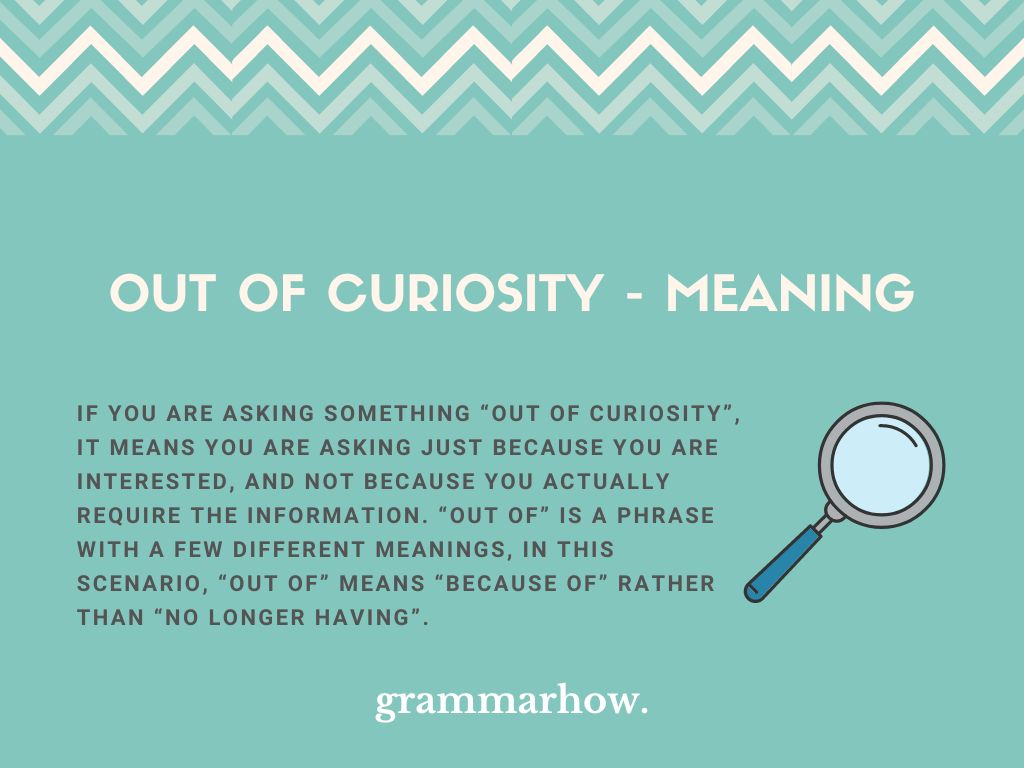Have you ever heard someone say that they’re asking a question “out of curiosity”?
You might have been left confused as to what they meant by that. Are they curious or not really curious at all?
Luckily, you can defeat your own curiosity and find out the answer below.
Out Of Curiosity – Meaning
If you are asking something “out of curiosity”, it means you are asking just because you are interested, and not because you actually require the information. “Out of” is a phrase with a few different meanings, in this scenario, “out of” means “because of” rather than “no longer having”.

If we take a look at the Cambridge Dictionary, under “out of” in section B2 we will find this definition:
- Used to show the reason why someone does something.
Then, if we go look up “curiosity”, we can see that it is defined as:
- An eager wish to know or learn about something.
There is also an example, which is very handy for our purposes, given:
- She decided to call her ex-boyfriend out of curiosity.
Never a good idea, by the way.
So, when someone does something “out of curiosity”, it doesn’t mean they are doing it with zero curiosity. It means that what they are doing has grown out of their curiosity – it is the motivation for their action.
The English language does love to be confusing though, so if someone were just to say:
- I am out of curiosity.
That would meanthat they don’t have any curiosity left – they are out of it as it has been emptied from them.
However, the majority of the time that “out of curiosity” is used, it means that a person is, in fact, full of curiosity. You should be able to pick up on this from context clues and the example sentences below will help you get a feel for it.
How to Use “Out Of Curiosity” in a Sentence
Here are some examples of how you can use “out of curiosity” in a sentence:
- Wait, is Shahid single again? Just out of curiosity, of course.
- Out of curiosity, what was that weird sound coming from your room last night?
- When did you guys get married, out of curiosity?
- I’m just looking him up out of curiosity, I’m definitely not going to get back in touch with him.
- Out of curiosity, did you bring a map? I’m not saying that we are lost but just in case we are, did you?
Sometimes, when a person uses the phrase “out of curiosity” they really are just asking out of innocent interest. However, sometimes they might have other intentions. Sadly, you’ll need to figure out that part for yourself.
Out of these examples, who do you think is really just curious, and who really wants that information?
Out Of Curiosity – Synonyms
The phrase “out of curiosity” appears in a few different ways that all retain the same meaning.
You frequently see it with a “just” at the front:
- Just out of curiosity
Here, “just” is used to mean “only” – so it’s really emphasizing that the question stems from “curiosity” and has no other intent.
You will also frequently see it paired with “sheer”:
- Out of sheer curiosity
“Sheer” is a synonym for “complete”, so it serves the same purpose as “just” in this sentence.
Some other synonyms are:
- For curiosity’s sake
- For the sake of curiosity
Incorrect Ways to Use “Out Of Curiosity”
You shouldn’t use the phrase to indicate that someone is incurious.
If a person is asking a question “out of curiosity” they are not asking the question even though they aren’t curious about the answer, they are asking because they are so “curious”.
Remember, in this phrase “out of” means “because of”.
So, “asking out of curiosity” doesn’t mean asking a question while not feeling curious at all, it means asking a question that is purely motivated by your desire to know the answer.
In What Situations Can You Use “Out Of Curiosity”?
“Out of curiosity” is not a particularly formal or informal phrase and could be used in any setting.
You should use it to show that you, or a character you’re writing, is being motivated by their curiosity to do something, whether that’s asking a question or going on an adventure.

Martin holds a Master’s degree in Finance and International Business. He has six years of experience in professional communication with clients, executives, and colleagues. Furthermore, he has teaching experience from Aarhus University. Martin has been featured as an expert in communication and teaching on Forbes and Shopify. Read more about Martin here.
